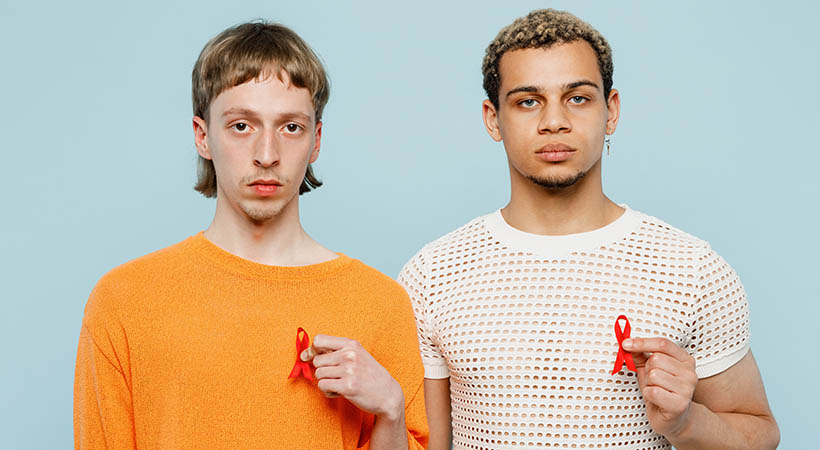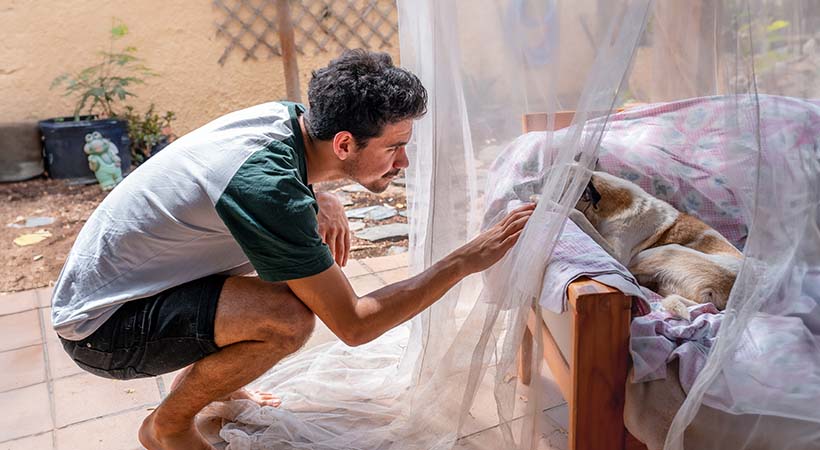The spicy, nose-turning scent of mozzie repellent is the scent of the Australian summer.
As the weather (like our saunas) gets steamier and wetter, mosquitoes multiply.
So what dangers do these tiny vampires pose? Can mozzies transmit HIV? And what can you do to protect yourself this hot gay summer? We are here to clear the air of mosquitoes.
Can you get HIV from a mosquito bite?
Wondering if that annoying hum that kept you up all night will transmit HIV? The answer is no.
Mosquitoes cannot transmit HIV, as they don’t have CD4 cells (T-cells) like we do. Since CD4 cells are what allow HIV to survive and reproduce in humans, mosquitoes cannot acquire it.
Did you know that when a mosquito bites you, it leaves saliva, not blood (that’s what makes them itch!) This means they cannot pass HIV from person to person as their saliva does not carry HIV.
And even if you do eventually spit the crap out of that scumbag that was eating you alive, the blood won’t carry enough HIV to spread to humans. So no need for a nightmare with a protagonist Louie the Fly anytime soon.
HIV stigma
The transmission of HIV through mosquitoes is just one example of the misunderstanding of HIV and how it is transmitted.

HIV has long suffered from misunderstandings, many of which are harmful to people living with HIV. News correspondent Karl Schmid is one such person, who spoke with us about his experiences after disclosing his HIV status. He faces stigma, such as people seeing him as immodest or dirty. Karl suggests that stigma “… goes back to lack of education. I think we’re finally starting to break down the barriers.”
He continues:
“People go ‘well, how are you going to end the stigma?’ We’ll talk about it. … My HIV status is no longer a reason to fear me. But instead of asking me if I’m ‘clean’, ask me about the state of my sexual health.”
Karl Schmid on the stigma of HIV | Part 2/3
Anxiety surrounding HIV and its transmission has a long history within and outside the gay community. But so is our progress in understanding HIV. We know that people living with HIV who maintain an undetectable viral load cannot transmit the virus. By educating ourselves and talking openly about HIV we can reduce the stigma towards people living with the virus.
Let’s listen and learn some basic facts about HIV.
How is HIV transmitted?
Mosquitoes do not transmit HIV, and neither does touching, kissing or sharing eating utensils with a person living with HIV. Transmission of HIV usually occurs by having sex without a condom or by sharing injection equipment.
What should you know about these mozzies then? And what can you do to minimize the risk?
What are mosquito-borne viruses?
Mosquito-borne viruses are diseases transmitted by mosquitoes to humans. WHO explains that mosquitoes can transmit certain viruses by ingesting the blood of an infected host (human or animal) — although this is not the case for HIV. They can then pass the virus on to another host.
You may be aware of mosquito-borne viruses such as Malaria and Zika. However, there is no reason to panic and buy Aeroguard, as many of these viruses can be prevented with simple measures.

Danger
Areas affected by flooding may be at higher risk from mosquito-borne viruses. Check the links at the bottom of this article to get information from your local health authority.
Prevention
Some household measures that have been suggested include:
- Cover up by wearing long, loose clothing – mosquitoes can bite through tight clothing.
- Use mosquito repellents containing Picaridin or DEET on all exposed skin.
- Limit outdoor activity – especially at dusk and dawn.
- Using knockdown fly spray, mosquito nets or plug-in repellent while sitting or eating outdoors.
- Removing water sources where mosquitoes can breed around the house or a campsite.
- Make sure windows are equipped with mosquito nets or screens.
For more information on mosquito-borne viruses and vaccines available visit your state, territory or federal health sites: FEDERAL | PRETEND | NSW | NT | QLD | SA | TAS | VIC | WA
